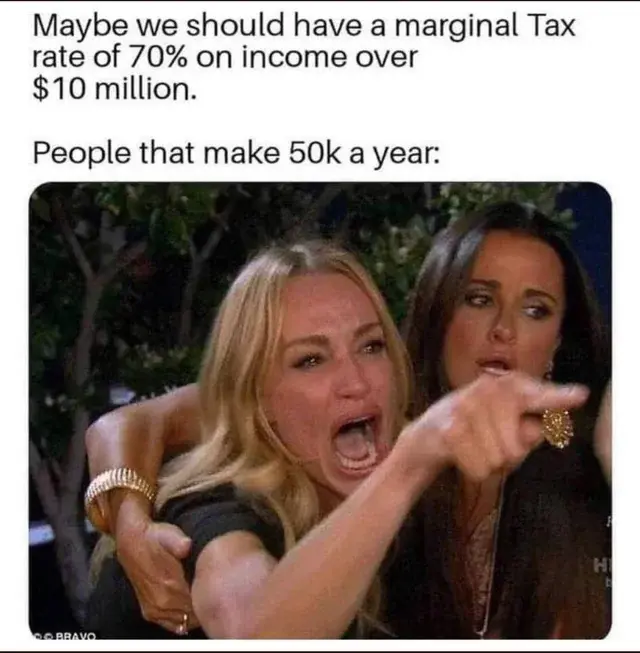this post was submitted on 15 Jan 2024
1814 points (97.6% liked)
Political Memes
5428 readers
2352 users here now
Welcome to politcal memes!
These are our rules:
Be civil
Jokes are okay, but don’t intentionally harass or disturb any member of our community. Sexism, racism and bigotry are not allowed. Good faith argumentation only. No posts discouraging people to vote or shaming people for voting.
No misinformation
Don’t post any intentional misinformation. When asked by mods, provide sources for any claims you make.
Posts should be memes
Random pictures do not qualify as memes. Relevance to politics is required.
No bots, spam or self-promotion
Follow instance rules, ask for your bot to be allowed on this community.
founded 1 year ago
MODERATORS
you are viewing a single comment's thread
view the rest of the comments
view the rest of the comments

Unrealized gain is by definition not income, that's what "unrealized" means.
Let's say you buy a house for $300k and the value goes up to $400k. But you don't sell it because you want to keep living there. Too bad, now you have an unrealized gain of $100k and you owe taxes on that. At the current rate, if your regular income is between $47k and $518k, this would cost you 15 grand. Not to mention you'd have to pay this tax every year that your house appraises for more than you bought it for.
Still sound like a good idea?
Yeah, you don't magically have to pay income tax on unrealized gains. You pay income tax on income. That's why it's called income tax.
You owe property taxes on it, if it's an asset property, and your location has property taxes. If it's stocks and bonds, you wouldn't have the same problem.
This was a hypothetical, because thread OP was suggesting a tax on unrealized gains. I was just trying to explain the possible consequences of such a tax.
In order to tax unrealized gains, they WOULD have to be treated as income, even though they really aren't, because if you didn't sell an asset, you didn't make any money. Unless you rented it out, of course, but rental income is already treated as such.
As far as stock or bonds go, it's the same. Imagine you buy some stock to hold for the long term. Well, if it goes up, and there's a tax on unrealized gains, you'd be owing taxes on every dollar it has gone up from the purchase price, EVERY YEAR that you hold it. It would almost be like having to pay rent on something you already own, and of course that would make long term investing extremely unattractive, not to mention it would basically eliminate any chance that normal people have at building any wealth whatsoever.
Also, if long term investing becomes unattractive, that means people would likely just try to sell everything the same year they bought it, meaning there'll be a lot more short term trading (and thus rampant speculation) going on. Even if you put generous exemptions in place to avoid penalizing the lower and middle classes with this, taxing unrealized gains would lead the super rich to engage in more short term speculation, which means the markets would become much more unstable. It's literally the dumbest idea anyone could think of unless their goal is to just cause as much pain and chaos as possible.